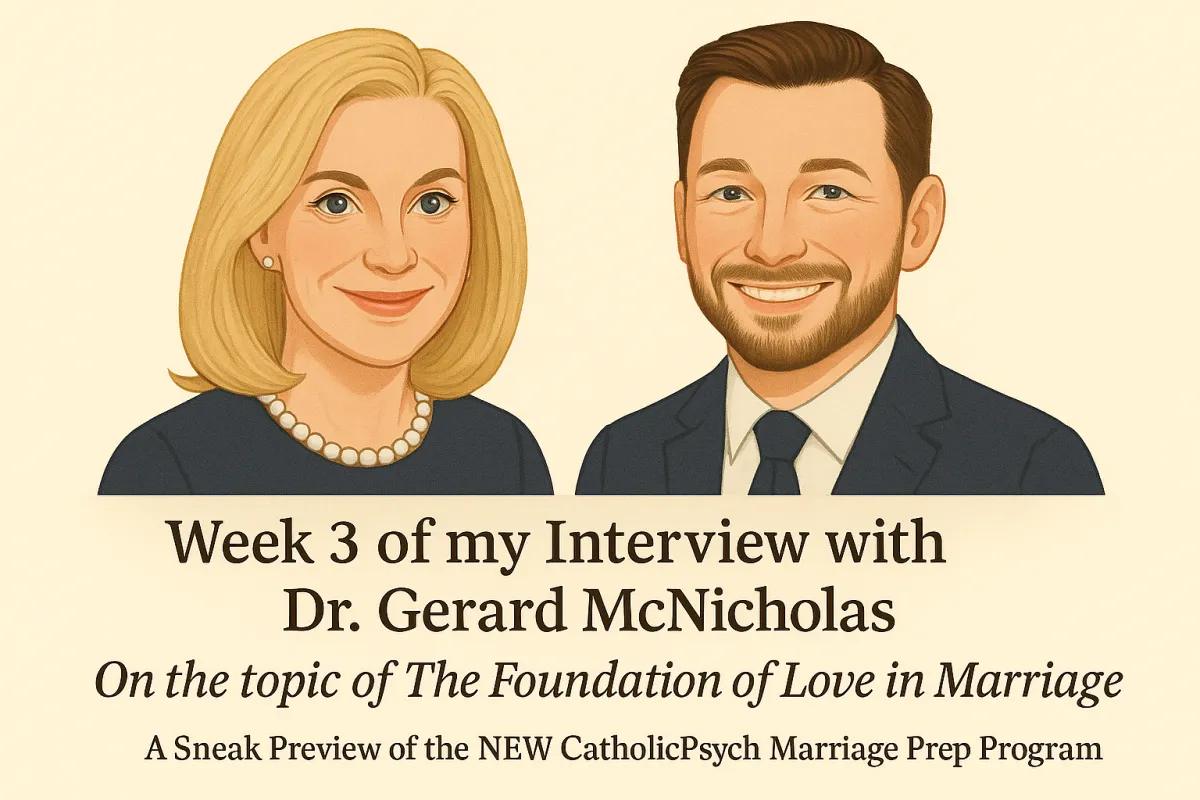
The Foundation of Love in Marriage
The Foundation of Love in Marriage
A Dialogue on Amoris Laetitia through a Psychological Lens with Dr. Gerard
Week 3 – Conversations with Dr. Gerard McNicholas
An 8-week collaboration offering a sneak preview of Module 1 from the new CatholicPsych Marriage Prep Program, Gift: A Marriage Built to Last.
What makes a marriage last? Ask ten couples, and you will hear answers like communication, romance, or shared goals. All important, but Pope Francis reminds us in Amoris Laetitia that the true foundation is something deeper: love that is patient, kind, forgiving, humble, and enduring.
This love is not a passing feeling. It is a decision repeated every day in small, ordinary moments: a kind word instead of criticism, forgiveness after an argument, the choice to listen instead of insisting on being right. Over time, these daily acts form the bedrock of a marriage that can weather any storm.
Love as Patience and Kindness
Patience gives space for growth; kindness transforms that space into connection. Together they create an atmosphere of safety where love can take root.
In mentoring couples, I have seen again and again that it is often not the grand gestures but the daily pauses that strengthen a marriage: taking a breath instead of snapping, softening one’s tone, offering encouragement when it would be easier to criticize. These small choices slowly change the climate of a relationship.
And this is not only a spiritual truth. Psychology confirms that these repeated patterns form the emotional foundation couples depend on.
Love as Forgiveness and Generosity
No couple escapes conflict. The question is not whether hurt will happen, but how quickly spouses choose to forgive.
Forgiveness prevents resentment from calcifying into walls that shut the other out. It is not weakness but strength, a deliberate decision to give the relationship another chance to grow.
Hand in hand with forgiveness is generosity, the willingness to put the other’s needs ahead of one’s own, not out of duty but out of joy. When generosity replaces scorekeeping, marriages shift from competition to communion.
Love as Friendship and Respect
Pope Francis reminds us that love in marriage is not only passion but deep friendship. Friendship means being known, valued, and enjoyed for who you are, a companionship rooted in respect.
Respect is more than politeness. It is the refusal to belittle, manipulate, or dominate. It honors the dignity of the other and preserves the balance of equals.
In my years of mentoring, I have found that couples who make respect non-negotiable, even in moments of tension, develop a resilience that carries them through seasons of struggle.
The Church calls these habits virtues. Psychology describes them as essential for secure bonds. To explore this convergence more deeply, I turned to Dr. Gerard.
My Conversation with Dr. Gerard
Kristin: In this session we lean on Pope Francis’s Amoris Laetitia, where he reflects on St. Paul’s words in 1 Corinthians 13. We tell couples it is these daily choices, not just feelings, that form the foundation of lasting love. From your perspective, how does psychology affirm this?
Dr. Gerard: "This resonates strongly with the perspective of Emotionally Focused Therapy, developed by Dr. Sue Johnson. EFT, grounded in attachment science, shows that love is not just a contract or negotiation but a deep emotional bond. In childhood, we thrive when loved ones are accessible, responsive, and attuned, and in marriage, that same pattern continues. As Genesis 2:24 confirms, a person leaves father and mother and clings to husband or wife, and they become one flesh. Psychology and Scripture converge here: love is about secure connection, and when couples live that daily through patience, kindness, and forgiveness, they form the foundation for lasting love".
Kristin: That is so powerful, Scripture and psychology both pointing to love as this deep, enduring bond. From your perspective, how do couples live that out in practice?
Dr. Gerard: "EFT shows that love grows when partners feel safe, safe enough to be vulnerable, to turn toward each other, and to stay emotionally attuned. What harms the bond is what Sue Johnson calls the “dance of disconnection,” where couples slip into pursuing and withdrawing and start to see each other as the problem. The real enemy is the cycle, not the spouse. Protecting love means turning against this pattern together and turning back toward each other with tenderness and responsibility, what John Paul II references as a true gift of self".
A Deeper Dive: Virtues Confirmed by Research
What Dr. Gerard describes on the level of emotional bonds, Pope Francis grounds in daily virtues. And research affirms the same truth.
Decades of studies confirm that the strongest predictor of marital stability is not how often couples argue but how they treat one another in ordinary moments. Couples who practice patience, slowing down before reacting, and kindness, offering small, consistent gestures of care, create an emotional climate that shields their relationship.
Forgiveness is equally vital. Without it, resentment corrodes intimacy over time. Theology calls these habits virtues; psychology calls them protective factors. Both agree they are essential.
Respect may be the most crucial of all. Contempt, sarcasm, belittling, eye-rolling, is the single strongest predictor of divorce. Respect is the antidote. It safeguards equality, preserves dignity, and ensures that love never becomes controlling or manipulative. When couples choose respect even in conflict, they protect their bond and make room for both to flourish.
A Marriage Built to Last
The foundation of love in marriage is not a single promise made on the wedding day. It is built through thousands of small, ordinary choices that grow into something extraordinary.
Patience, kindness, forgiveness, generosity, and respect are not lofty ideals. They are the bricks and mortar of a marriage that lasts, heals, and matures in holiness.
A wedding begins with celebration, but it is these daily choices that sustain a couple through the seasons of life, weaving faith, psychology, and lived experience into a love that endures.
For Reflection: Which of these daily bricks—patience, kindness, forgiveness, generosity, or respect—do you sense God inviting you to strengthen in your own marriage (or future marriage) this week?
This article is a sneak preview of CatholicPsych’s new marriage preparation program, Gift: A Marriage Built to Last.
If this reflection spoke to you, you can find more resources and explore mentorship at KristinBeckChmiel.com.


